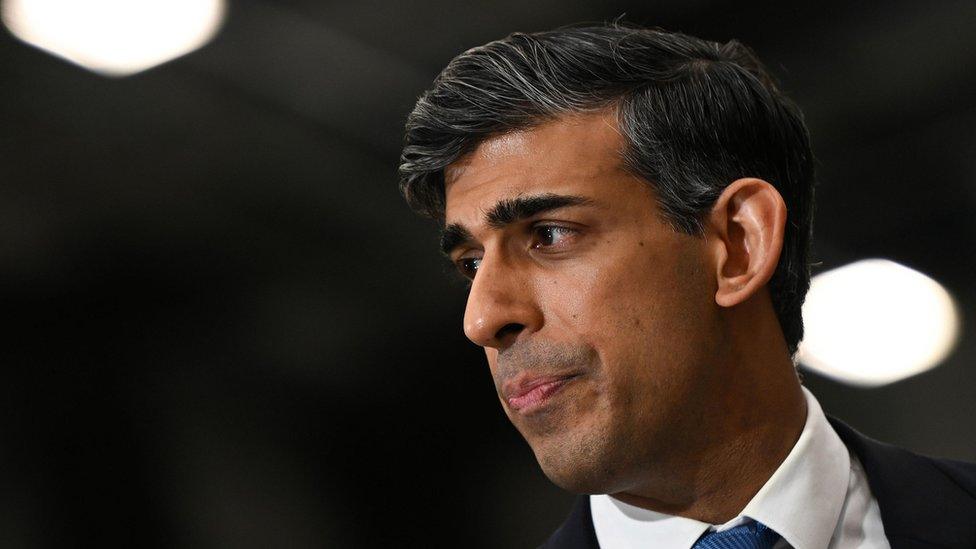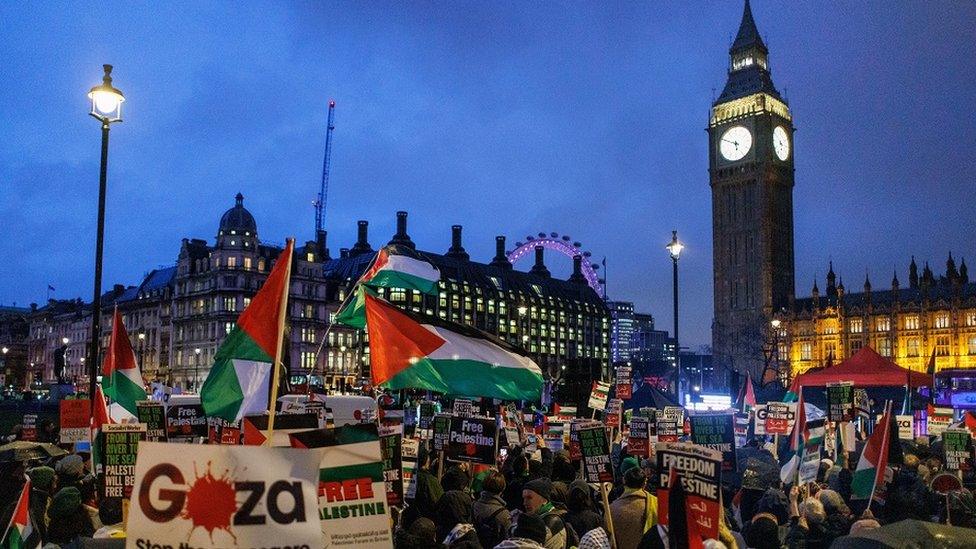We must face down extremists undermining democracy, says Rishi Sunak
- Published
PM: 'There are forces here at home trying to tear us apart'
The UK must face down extremists trying to "deliberately" undermine the country's "multi-faith democracy", Rishi Sunak has warned.
The PM said Islamists and the far-right were "two sides of the same extremist coin" who loathed Britain.
He also expressed concern about the regular protests taking place in response to the Israel-Gaza conflict.
Mr Sunak spoke at a lectern outside No 10, a set up usually reserved for big announcements such as elections.
However, he did not set out details of any new policies.
The prime minister had already given his response to the Rochdale by-election, saying earlier in the day that the campaign had been one of the most divisive in recent times and praising the Tory candidate's positive message.
But only a few hours later he decided, outside Downing Street, to take aim at George Galloway, saying it was "beyond alarming" that voters in Rochdale had returned a candidate who he said had "dismissed what happened on 7 October" in Israel.
There was tough rhetoric on extremism, warnings of "forces here at home trying to tear us apart" - but no repeat of the phrase "mob rule" that he'd used in a statement following a meeting with police on Wednesday in Downing Street.
Instead there was a reference to "small groups" hijacking protests. He was careful to reference both Islamist and far-right extremism, as well as condemning antisemitism and anti-Muslim hatred.
There was little mention of law changes beyond a message to police that he would back them taking action at protests.
Speaking to BBC News after the prime minister's speech, Mr Galloway said: "My views are my views and they were endorsed by the electorate.
"I won and people are going to have to get use to it."
Galloway: I won, people are going to have to get used to it
Labour leader Sir Keir Starmer said the prime minister was right to "advocate unity and to condemn the unacceptable and intimidatory behaviour that we have seen recently".
He added: "This is something agreed across the parties and which we should all defend."
Liberal Democrat leader Sir Ed Davey said: "The British people will take no lessons from a prime minister and Conservative party who have sowed the seeds of division for years. SNP MP Alison Thewliss said Mr Sunak had "repeatedly, and very deliberately, sought to stoke up divisions, pander to the far-right and pit communities against each other for electoral gain".
In his Friday evening speech, Mr Sunak warned democracy had become "a target" and that MPs no longer felt safe.
He expressed his fears about protests that had taken place in the aftermath of Hamas' attack against Israel, saying they had "descended into intimidation, threats and planned acts of violence".
The police had a "tough job" in managing the protests he said but insisted "we must draw a line".
He said people on marches should not be allowed to call for violent Jihad or for the eradication of any state.
Mr Sunak promised to back the police and said his government would be introducing "a new robust framework for how it deals with this issue".
He also said his government would re-double support for the anti-terrorism Prevent programme, demand universities tackle "extremist activity" and stop people coming to the UK "whose aim is to undermine its values".
Divisions over the Israel-Gaza conflict have led to heightened political tensions in UK politics in recent months.
Last week Commons Speaker Sir Lindsay Hoyle said fears over threats to politicians was partly behind his controversial handling of a debate on Gaza.
Conservative MP Tobias Ellwood's home was targeted by pro-Palestinian protestors and Justice minister Mike Freer said he would be standing down due to safety fears.
Responding to concerns the Home Office announced £31m of funding aimed at protecting democratic processes including expanding security for politicians.
Related topics
- Published29 February 2024

- Published26 February 2024
- Published28 February 2024
